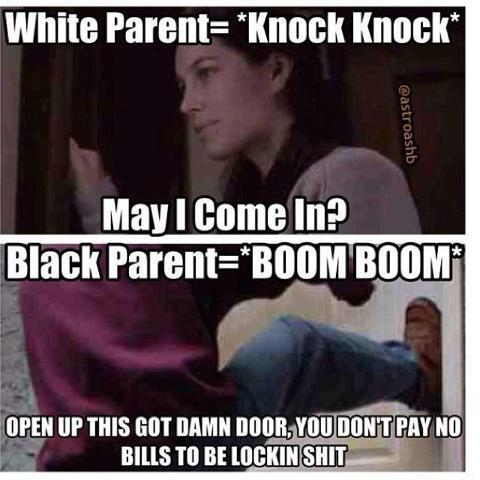Reading The Silenced Dialogue this week was somewhat difficult. I found myself re reading paragraphs and sentences over and over again trying to fully comprehend the points Delpit was discussing. I struggled at first to really find something that sparked an interest and that I could relate to personally until around page 8. Unfortunately it took me half the reading to finally connect to something but I’m glad I did because honestly I think it helped me to understand Delpit’s argument more. On page 8 Delpit begins to discuss differences in the way that middle-class white children and black children are spoken to at home. Delpit states that “middle-class parents are likely to give the directive to a child…as a question…By contrast, a black mother, in whose house I was recently a guest, would never pose the directive to her son in the form of a question.” I found this statement to be highly interesting. It was crazy to think that just the way you speak to your child and address them is something that varies based on race. And to think that that could set them ahead or behind in school is even more alarming just because it doesn’t seem like it would be that problematic. When I read Delpit’s paragraphs on page 8 about the variation on how white parents versus black parents interact with their children I couldn’t help but think of the numerous “Vines” and Instagram pictures that I had seen with titles like “Black Parents vs. White Parents”. If you’ve ever seen one of these Vines then you’ll know how stereotypical they are. Growing up as a middle class white girl, I have no clue how a black parent in real life actually speaks to his or her child. But it seems that these Vine videos and photos really seem to support Delpit’s argument. Like this one for example:

See what I mean, totally stereotypical. Although these videos and photos are made with the intention of making people laugh, this speech difference is one of the contributing problems to Delpit's culture of power argument. Differences in speech between people in the culture of power and people outside of the culture of power is something that furthers the gap between the two groups. So even though these may give us a slight laugh from time to time, it's shocking how true they are, even if they are somewhat exaggerated.
Another social media site where this topic of "Black Parents vs. White Parents" has been brought up is Twitter. Babble.com, a blog and magazine for parenting recently compiled a list of White Parent quotes and Black Parent quotes that were posted to twitter. I feel that this article too is another real world example of what Delpit is talking about on page 8:
White Parent Quotes Vs. Black Parent Quotes: Stereotypes Battle It Out On Twitter
Hope you enjoyed my post! Thanks for reading !
Hey Jen, I liked how you focused on one specific part in the article that you can relate to and have an opinion about. I agree with you on everything, especially how the social networks portray the differences between white parents and black parents. Great job!
ReplyDeleteI found it really interesting as well that how parents speak to their children is something that varies across cultures and ethnicities. The fact that that might affect the way a child learns in the classroom depending on the teacher had never occurred to me before. I'm glad someone else found that as interesting as I did. Good work!
ReplyDeleteHi Jen, great job with this post! I also thought that the section on race determining how a parent speaks to their children to be very stereotypical, and I wondered how true that was. I liked how you put in the link to the website, too!
ReplyDelete